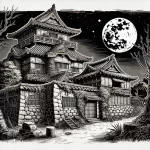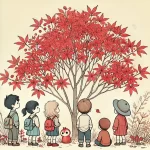うみ [Umi]
Words : 林柳波 [HAYASHI Ryūha]
Music : 井上武士 [INOUE Takeshi]
Let’s learn Japanese through children’s songs. It’s okay even for beginners.
It’s better if you read the previous song, “Kotori no Uta,” first.
うみは ひろいな
umi wa hiroi na
おおきいな
ōkī na
- うみ(海) [umi] : sea
- 広い(ひろい) [hiroi] : wide
- おおきい(大きい) [ōkī] : big
(translation) “The sea is wide,
and big.”
The “な / na” in “hiroi na” and “ōkī na” expresses the speaker’s admiration. In this context, they are impressed by the vastness of the sea. In Japanese, there are various sentence-ending particles like this. You don’t have to worry too much about them at first.
つきは のぼるし
tsuki wa noboru shi
ひがしずむ
hi ga shizumu
- 月(つき) [tsuki] : moon
- のぼる(登る) [noboru] : rise
- 日(ひ) [hi] : sun
- しずむ(沈む) [shizumu] : set
(translation) “The moon rises,
and the sun sets.”
The “し / shi” in “noboru shi” means “and.”
In Japan, an island nation surrounded by the sea, it is common to see sunsets over the horizon.

うみは おおなみ
umi wa ōnami
あおいなみ
aoi nami
ゆれてどこまで
yurete doko made
つづくやら
tsuzuku yara
- なみ(波) [nami] : wave
- おおなみ(大波) [ōnami] : big wave
- あおい(青い) [aoi] : blue
- ゆれる(揺れる) [yureru] : sway
- どこまで [doko made] : how far
- つづく(続く) [tsuzuku] : continue
(translation) “The sea has big waves,
and blue waves.
How far do they
continue as they sway?”
Just remember that “おお / ō” indicates something big, like in “おおきい / ōkī” (big).
It’s the opposite of “こ / ko,” which we learned in the previous “Kotori no Uta.”
うみに おふねを
umi ni ofune o
うかばせて
ukabasete
いって みたいな
itte mitai na
よその くに
yoso no kuni
- ふね(船) [fune] : boat
- うかばせる(浮かばせる) [ukabaseru] : float
- いってみたい(行ってみたい) [itte mitai] : want to go
- よそ(よそ) [yoso] : other
- くに(国) [kuni] : country
(translation) “I’d like to float a boat
on the sea and
visit a foreign country.”

The “お / o” in “ofune” makes it polite, similar to “おかあさん / okāsan” (mother) from the previous song “Kotori no Uta.”
うみは ひろいな
umi wa hiroi na
おおきいな
ōkī na
つきは のぼるし
tsuki wa noboru shi
ひがしずむ
hi ga shizumu
The end.
From here, some extra notes.
As mentioned earlier, Japan is an island nation surrounded by the sea. The Japanese often imagine countries they’ve never visited across the vast Pacific Ocean, like America.
Interestingly, this song was composed in 1941, during World War II. Ironically, Japan and the United States went to war in December of that year, starting the Pacific War. A few years later, censorship made it difficult to freely express longing for foreign countries. The lyrics
“いってみたいなよそのくに / itte mitai na yoso no kuni” (I’d like to visit a foreign country)
are quite striking when considering that historical context.
Thanks for reading! Feel free to comment if you have any feedback or questions.
Follow me on X.



